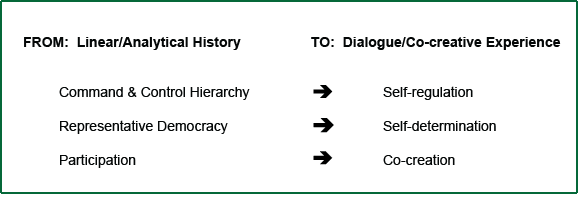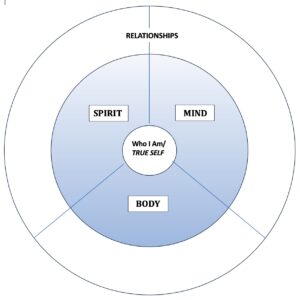Leadership’s evolution, within our current experience of the Innovation Age, shifts emphasis from role to responsibility. Understanding leadership, in today’s complex uncertain world, requires us to dig deeper into our fundamental principles. What was once the foreground of a leader’s responsibility — purpose, strategy, people, measurement, inspiration, results and rewards — has shifted to the background.
Although these competencies remain, what has emerged as foreground activities says Gary Burnison (2012) regardless of leader circumstance or style, are one’s ability to “lead, listen and learn.” Being responsible to and for others, listening from a place of integration, and learning how to transform information and knowledge into usable wisdom are also viewed as the characteristics of an enlightened master in most spiritual traditions.
But if that isn’t enough, today’s leaders must also continually anticipate what is next, navigate course corrections and communicate with passion and inspiration. Remarkably, these competencies characterize not just leadership capability but human self-mastery.
If your actions inspire others to dream more, learn more, do more
and become more, you are a leader. John Quincy Adams
These emerging beliefs about leadership — roles not merely played by the elite few but responsibilities shared by the many — are demanding our behaviours to catch up. Burnison’s “absolutes of leadership” are the stepping stones for self-mastery just as Plato’s (429 to 423 BC) doctrine “all knowledge is self-knowledge” asserts humanity’s longtime search for a set of fundamental guidelines by which to live and lead. Furthermore, as recently as the 1990s, both Social and Emotional Intelligence emerged as theories set on explaining the understanding and management of self and others.
At a personal level, leadership’s evolution emerges as self-regulation and self-determination. At a societal level, the shift moves from representative democracy (for the people) to participative governance (by the people) — self-determination and co-creation.
 Whether leading in our own lives or sharing the social responsibility of collaborating with others, overly dependent behaviours are giving way to interdependence. Interdependency (playing well with others) necessitates self-regulation and self-determination.
Whether leading in our own lives or sharing the social responsibility of collaborating with others, overly dependent behaviours are giving way to interdependence. Interdependency (playing well with others) necessitates self-regulation and self-determination.
I wrote the following poem as a depiction of my own pathway to self-mastery and leading in my own life.
Exposed
A youthful, plaintive cry of “Why me? Why this? Why now?”
lamented the loss of a loved one.
Is it even possible to lose love?
Something like a thought, deep inside echoes,
“Impossible. All feelings originate within.
They cannot be lost, only forgotten. Love never dies.”
Truth rises out of experience, and memories
of long dead lovers lift the corners of this mouth to a smile,
the love as fresh today as ever.
This personal appeal of “Why me?” registered fear.
Is it possible to forget fear, to travel back from woeful pity parties
and return to wondrous curiosity?
Experience unravels fear, exposing bravery.
So I ask, “If not me, then who?”
October 2012
For more on leading toward self-mastery, click here.





